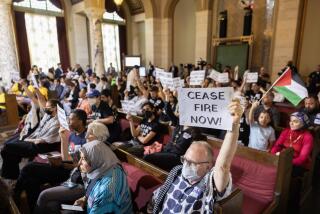Reject Bigotry, Dinkins Tells New Yorkers : Race relations: The black mayor delivers his message in a climate of anxiety in the city. Critics said he had not done enough to defuse tensions.
- Share via
NEW YORK — Mayor David N. Dinkins urged all New Yorkers on Friday to reject calls for bigotry and pledged his Administration would never lead by “setting some of us against the rest of us, or by favoring one group over others.”
The speech, clearly the most important of Dinkin’s five months in office, came amidst a climate of increased racial anxiety in the city. Dinkins has been accused for the past week of not acting forcefully enough to promote better understanding in the city and to defuse tensions.
The trial of two white youths accused of killing a black teen-ager in Brooklyn’s Bensonhurst neighborhood, coupled with a boycott by blacks of several Korean grocery stores, and campus racial unrest have troubled many New Yorkers.
Dinkins condemned both the Bensonhurst crime and the grocery store boycott.
The death of Yusuf Harkins in Bensonhurst was “a hateful crime” committed by individuals, he said. But “all of Bensonhurst did not commit this crime. . . . We must absolutely, categorically reject the despicable notion of group guilt.” Verdicts in the case are expected shortly.
Dinkins condemned the protesters who had punched one of the defense lawyers in the Bensonhurst case as he left the courthouse Wednesday for lunch.
And turning to the dispute between black pickets and Korean shop owners, he stressed that he opposes any boycott based on race, labeling demonstrations against the shop owners “on-going intimidation.”
“Boycotts can be an appropriate and effective response--but this one is not and the vast majority of the people in that community know it,” he said.
The boycott began after a Haitian customer claimed she was attacked by a Korean merchant. The store’s owner, in turn, said that the woman, who refused to pay the full price of her groceries, had to be restrained when she grew violent.
Both the New York Times and a local judge trying to mediate the dispute had earlier called on Dinkins, the city’s first black mayor, to act to end the boycott.
“It was a well-written and an important speech,” said David Garth the political strategist and media consultant who conducted former Mayor Edward I. Koch’s primary campaign against Dinkins. “The problem is, it puts a tremendous amount of pressure on him. This is a speech you do once, not twice. It was what people wanted to hear.”
Dinkins said “this city is sick of violence. We’re aching--and we must heal the pain.” The mayor told a City Hall audience of businessmen, clergy and civic leaders: “I oppose all bigotry against anyone, anywhere. I abhor it; I denounce it; and I’ll do anything--anything right and anything effective to prevent it.”
The mayor outlined a series of initiatives designed to improve race relations. He said he would press for a tough new law against gang violence, would enhance the city’s abilities to find tensions and stop problems before they start. He called upon New York’s clergy to speak to their congregations about tolerance and respect.
More to Read
Sign up for Essential California
The most important California stories and recommendations in your inbox every morning.
You may occasionally receive promotional content from the Los Angeles Times.













